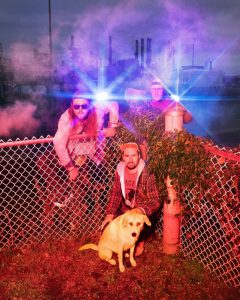Jérôme Beaulieu was ecstatic on my computer screen. Gilles Peterson, the instigator of the early-’90s acid-jazz movement, and founder of the genre’s beacon label, Talkin’ Loud, had just played Misc’s freshly released track “Mad” – from the album Partager l’ambulance – on his BBC Radio 6 show.
 “It’s always been clear to me,” says the pianist, “that the Misc adventure couldn’t be confined to the province of Québec. We make niche instrumental music, and that means your market needs to be international, if you have any hope of earning a living with it. We did get visibility through the Révélation Radio-Canada Jazz 2013-2014 (back when the band was called Trio Jérôme Beaulieu), and that allowed us to tour. But it’s not enough. We’re developing the market in France and Great Britain. They love our style of music there.”
“It’s always been clear to me,” says the pianist, “that the Misc adventure couldn’t be confined to the province of Québec. We make niche instrumental music, and that means your market needs to be international, if you have any hope of earning a living with it. We did get visibility through the Révélation Radio-Canada Jazz 2013-2014 (back when the band was called Trio Jérôme Beaulieu), and that allowed us to tour. But it’s not enough. We’re developing the market in France and Great Britain. They love our style of music there.”
It’s true that the three teasers dropped on YouTube ahead of the release of Partager l’ambulance (“Mad,” “Le Preacher,” and “Superman se pointera pas”) are quite intriguing. The animated shorts seem to evoke the global, anxiety-inducing crisis that Misc is trying to evoke with a symbolic raft, that carries an ambulance, and floats on the clouds with the help of a makeshift parachute – an idea created by illustrator Christophe B. De Muri.
“Re-inventing the jazz trio is ‘in’ at the moment,” says Beaulieu. “It’s also a reflection of the way we consume increasingly eclectic music; musical genres are harder and harder to define, anyway. Having access to all the music that exists with a single click can become dizzying.”
The trio went through two bassist changes – one of them went on to become an osteopath – since the release of their debut Misc in 2016 and Misctape Vol. 1 in 2017. At that point, the future of Jérôme Beaulieu’s trio was somewhat uncertain. “I don’t have a Plan B,” he says, “and there won’t be one!”
Then luck struck: Maurin Auxéméry, of the Montréal International Jazz Festival, gave them a challenge: re-visit the music of an artist that inspired them for a single show. The trio picked James Blake’s eponymous album of introspective electronica, released in 2011.
“It’s music that has no points of reference for a jazz trio,” says Beaulieu. “It’s so granular and electronically processed that we thought, ‘My God! What a trip! There are no clear sonic references.’ That show allowed us to integrate a whole new sound spectrum, and to adapt it to the trio’s very organic sound. His sonic references pulled us out of our universe, yet still allowed us to remain true to ourselves.”
Partager l’ambulance is directly inspired by this innovative homage to Blake, and heavily influenced by (the now defunct) Esbjörn Svensson Trio (EST) – Svensson being the Swedish explorer of the possibilities of the piano trio. Beaulieu, drummer William Côté, and bassist Simon Pagé locked themselves up in their studio, a batcave of endless possibilities.
“We added a whole bunch of sound effects,” says Beaulieu. “Our modus operandi is that everything in our music has to be tweak-able. The last thing we want is to become prisoners of a sequence that goes on and on; the interaction, on which jazz is based, must remain. There’s all kinds of stuff. For example, I put a piezo microphone (designed for guitars) inside the piano, so I can run the signal through effects pedals, and I also have a volume pedal, so I can control the balance between the piano and the electronics in real time.”
And when that piano plays thrums, one feels stuck to the ceiling. The vigorous rhythm section follows it in every detour and the melodies on Partager l’ambulance are timeless and compelling. In other words, we’re ultimately treated to something miles away from the usual jazz trio offerings. Misc isn’t the type of act to jump on any bandwagon. This album is openly aggressive.
“We had no idea the pandemic was coming when we recorded this in 2019,” says Beaulieu. “It’s the news that gave us this sense of urgency, especially when it comes to the environment.”
The trio has unquestionably crossed a threshold, that of a charming, precarious balance of its new music and its past. Misc seems to be able to cut creative jazz by the yard. And it’s probably as intense live as it is on record. So here’s to being able to experience it in person someday!